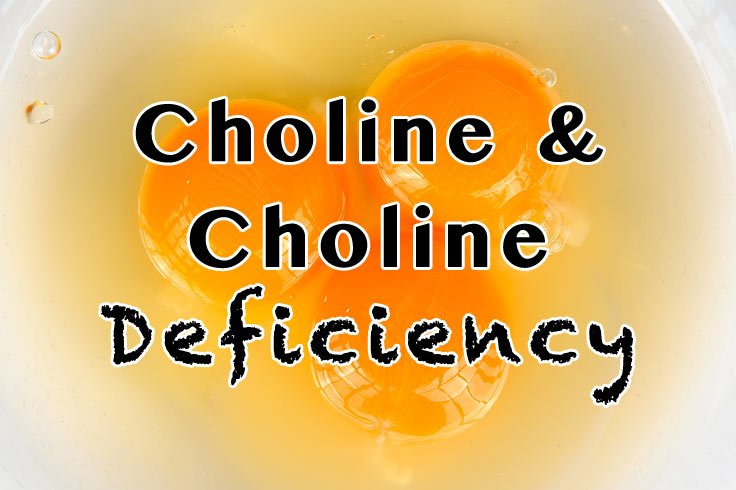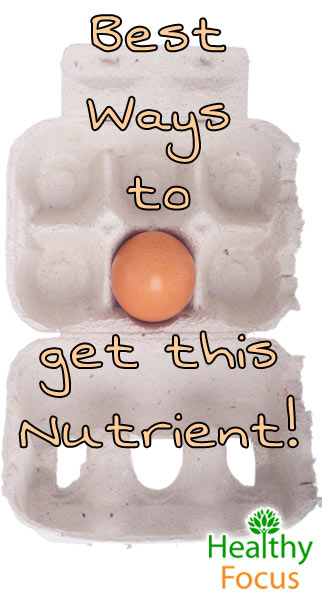Last Updated on June 3, 2018 by Marc Seward
What is Choline?
Choline is an important macronutrient which keeps your cells and nerves working efficiently. It is necessary for numerous bodily processes including nerve function, brain development, muscle mobility, liver function and ensuring a healthy metabolism.
It is present in a compound called phosphatidylcholine which is found in various foods that contain certain types of fat. It is believed that most people get sufficient choline from their diets but when they fail to do so; choline deficiency can occur and cause certain serious health problems including liver damage.
Although it is not strictly speaking a vitamin, choline works in a similar way to the B vitamins in that it supports energy, stimulates metabolism and aids brain function. It also helps communication between nerves and muscular movement along with numerous other bodily processes.
Recommended daily requirement
Avoiding choline deficiency is important because of the vast number of processes that it supports. Our bodies are only able to produce a small amount by themselves so it is important to get the rest from our diets. While choline is still being studied, the Institute of Medicine recommends the following daily doses:
- Adult men: 550 mg
- Adult women: 425 mg
- Pregnant women: 450 mg
- Breastfeeding women: 550 mg
- Babies and infants: 150 mg
- Children: 250 mg
What food contains choline?
You can get choline from numerous food sources including eggs, beef, liver, salmon, brussel sprouts, spinach, nuts, and cauliflower. Vegans are at a higher risk of choline deficiency and should ensure they eat enough high choline vegetables and nuts.
People who do not get enough choline from their diets may need to take choline supplements.
Signs of Choline Deficiency
Despite the fact that most people eat plenty of choline rich foods like eggs and meat, there is some concern that choline is not actually very well absorbed through dietary sources. Some studies have shown that on average, people do not have as much choline present in their body as the recommended amount. (1) However, the recommended dose is difficult to establish since different people have different needs depending on a variety of factors including genetics.
Symptoms indicating choline deficiency are varied and may include one or more of the following:
• Liver damage
• Fatigue and low levels of energy
• Cognitive decline and memory loss
• Learning difficulties
• Nerve dysfunction and damage
• Muscular aches and pains
• Poor muscle movement
• Mood swings and emotional disorders
Choline Deficiency Risk factors
People who are suffering from a liver condition known as fatty liver or fatty liver disease are more at risk of choline deficiency. This disease is caused when triglycerides accumulate in the liver’s cells and is especially common in alcoholics, the obese and diabetics.
It is also believed that choline deficiency may contribute to cognitive decline such as memory loss as we age. It may also be linked to Alzheimer’s disease because choline plays a vital role in maintaining neurotransmitters. (1) However, more research is necessary before any form conclusions can be made.
Why You Need Choline
1. Nervous system support
Choline is especially important when it comes to nerve function and health. It helps maintain brain cell membranes and aids effective nerve signals.
It also aids in the formation of healthy nervous system tissue which is vital to the brain’s growth and development. Choline plays a role in the function of neurotransmitters such as acetylcholine which is essential to healthy nerve and muscular function.
Because acetylcholine aids learning and memory, a deficiency in choline might hinder memory and learning and cause other cognitive problems especially as we age.
2. Liver function
Choline is important to proper liver function; it helps transport fats including cholesterol and triglycerides from the liver’s cells to the rest of the body. It helps keep the liver clean and prevents the build-up of fat which can result in complications.
Research shows that people with low levels of choline in their bodies are more at risk of liver damage and possibly even liver failure. (2)
Choline also aids the production of LDL cholesterol in the liver and while LDL cholesterol in the liver and while LDL has a bad rap, it is still necessary for healthy liver function and a deficiency results in more fat being stored within the liver.
3. Cognitive function and memory
Choline can help keep you mentally sharp, especially as you age and begin to experience cognitive decline. Because choline is a component of the cell membranes and neurotransmitters it can help preserve your memory, prevent signs of dementia and arrest the normal cognitive decline associated with aging.
Choline helps by maintaining the brain’s elasticity and it is acetylcholine levels which typically decline in old age. Certain studies have demonstrated that low acetylcholine levels are linked to cognitive disorders such as dementia and Alzheimer’s with Alzheimer’s patients often showing a much-reduced level of acetylcholine. (3)
4. Muscle function and exercise
One of the symptoms of choline deficiency is fatigue and lack of energy and choline is believed to have a positive impact on your energy levels as well as improving your focus and mental energy necessary for improved physical performance.
Choline may help your reaction times because of its effect on nerve signals and metabolism.
Choline is also believed to improve mood, sleep and shorten recovery times following exercise. Moreover, it plays an important role in efficient muscle movement and can help prevent muscular fatigue, aches, and pains.
5. Heart health
The science so far is not unanimous and while some studies have demonstrated that choline can help reduce cholesterol levels, other studies have not shown any effect. Some studies have concluded that choline helps to convert an amino acid called homocysteine and prevents the build-up of too much fat in the body. (4) Homocysteine comes from proteins usually meat and high levels are linked to heart disease and stroke.
6. Pregnancy
It is recommended that pregnant women consume more choline than anybody else because it is used by the fetus for the formation of their brains, cells, and nerves. Some studies have actually shown that pregnant women deficient in choline have an increased risk of giving birth to a child brain abnormalities and developmental issues.
Choline is found naturally in breast milk and is an ingredient in most baby milk formulas and is a vital component in the early formation of the brain. Choline interacts with folate and the other B vitamins to ensure healthy fetal development. It is recommended that a pregnant woman gets at least 450 mg of choline each day and that a breastfeeding woman gets 550 mg daily.
7. Growth and development
It is also important that children are not deficient in choline because it is necessary for healthy brain development, learning, focus and clear thinking. Research shows that choline is important for a child’s overall learning abilities and plays an essential role in memory, oral ability concentration and social ability. (5)
There is even some suggestion that choline can prevent learning difficulties and conditions related to learning such as ADHD.
Best sources of Choline
It is recommended that people get their choline requirement from natural food sources as very high doses of choline may result in side effects such as nausea, low blood pressure, liver complications and digestion issues. Try getting your choline from the following dietary sources:
• Beef liver (4 oz)– 470 mg
• Large egg yolk -145 mg
• I fillet of salmon – 242 mg
• 1 cup of chickpeas -198 mg
• 1 cup of split peas – 188 mg
• Turkey (3 oz)– 57 mg
• Chicken breast (3 oz) – 50 mg
• 1 cup of cauliflower – 47 mg
Choline Supplements
If you cannot get enough Choline through your diet Supplements may be an option. For general health benefits, the form of Choline is not critical and 250-500mg a day is sufficient.
For improved memory and cognitive benefits—higher doses are needed (over 1gram) and the form matters more. Choline Bitartrate and Lecithin are fine for general health. CDP Choline (Citicoline) and Alpha-GPC forms are better for boosting brain acetylcholine and free choline levels. Alpha-GPC has also some potential Growth Hormone boosting effects.
(1) http://www.ncbi.nlm.nih.gov/pmc/articles/PMC2782876/
(2) http://www.ncbi.nlm.nih.gov/pubmed/1452945
(3) http://www.ncbi.nlm.nih.gov/pubmed/6754453
(4) http://www.ncbi.nlm.nih.gov/pubmed/15699233
(5) http://www.ncbi.nlm.nih.gov/pubmed/11023003



Leave a Reply
You must be logged in to post a comment.